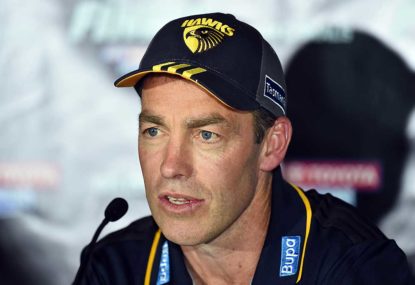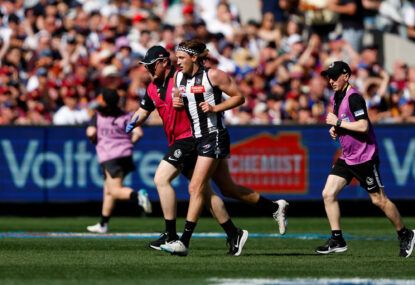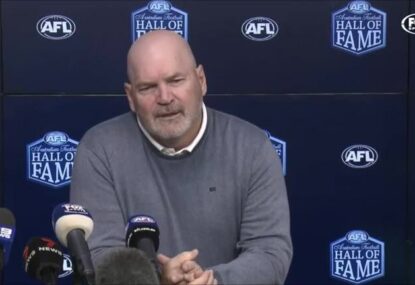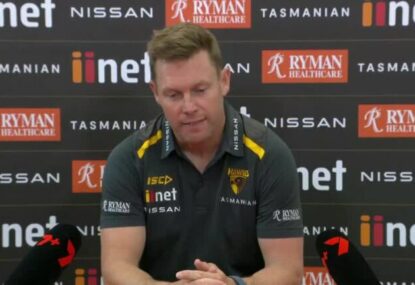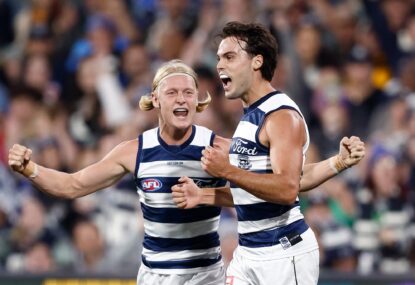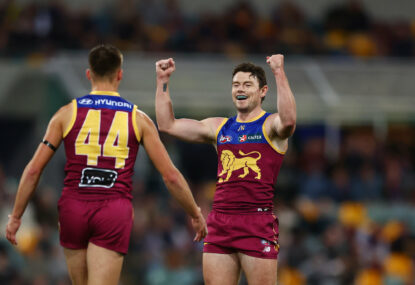Legacy loses its meaning if there is no practical example attached to it. Last weekend’s Anzac round was another example of the AFL using its unrivalled reach to promote a certified public value, and to good effect.
To use the overused refrain, the AFL does these things well. It’s no small feat to popularise a secular rite and still give the occasion the reverence it properly commands.
But there’s a distinction to be made between the production values of the tribute and the meaning of the thing we’re paying tribute to. The point of that silence was to lay bare the link between the sacrifices of the past and the opportunities of our present.
The key word, obviously, is sacrifice.
In a present translation, sacrifice probably means trimming your portfolio rather than risking your life. Specifically, it means settling for less, in the interests of the larger cause you serve and the people you’re serving it with.
That’s why Hawthorn coach Alastair Clarkson’s thoroughly atypical contract extension last week was a gesture worthy of the occasion. People who know him say Clarko himself would be embarrassed at such acknowledgment. All the more reason, then.
The announcement was a minor item among that day’s other significant news, which included his side’s Poppy-led, last-gasp win in what was probably the game of the season, and the indecorous passing of an American genius.
Moreover, the subject was broached reluctantly. Clarkson said there was nothing to be read into the time taken to finalise the deal. He’d put pen to paper that week only because “it was of more interest to people outside the club than within it.”
The negotiations actually weren’t all that protracted. But the reasons they dragged at all had to be dragged out of the coach, which also says something.
Pressed, Clarkson talked about the salary cap on coaching panels and the critical importance of his own assistants to Hawthorn’s incomparable current reign of dominance.
Pressed further, he said the senior coach “had to tow the line just like I expect our players to”.
Pressed further still, he said: “I wanted to make sure my salary wasn’t going north.”
I’ve never used a compass without getting lost, but I’m pretty sure north means up. Clarkson was haggling for less than the club wanted to pay him.
A small gesture, maybe, but you don’t have spend long in the war archives to see why it means something, last weekend more than most.
Read a few handwritten histories with their handwritten annotations and you get an idea of the material fortunes of those that did live to grow weary. They tell of mixed experience often characterised by lost prospects, large families, bad nerves and – a recurring theme – never a buck to spare.
It offers some necessary proportion to the overdramatised insecurities of today’s AFL wage slaves.
On the eve of this season three coaches – Ross Lyon, Nathan Buckley and Damien Hardwick – were given entirely unnecessary contract extensions. Between them, by way of vindication, they’ve since led their teams to twelve losses, two unconvincing wins, and whatever you call being in front of Essendon when the game ends.
The moral of that example doesn’t hold up because, as we know, calculations of success and failure are revised weekly in football. But there’s a self-evident moral hazard in there somewhere, surely.
Europe is one bad debt from another financial crisis, with nothing left in the bailout jar. Can the game afford the avarice that is the KPI of success today? Can the country?
Let’s talk contrasts. It was no surprise to see Mick Malthouse holding court from the SEN radio marquee outside the MCG on Monday.
Well, it was no surprise to me – it was Anzac Day, after all! Others thought it a bit strange that a man who was incapable of observing the minimum civilities when dealing with the media as a coach would join its payroll when his coaching was done.They don’t know Mick.
Consider the plan he floated in February to keep the 17 players under doping suspension in mint condition until they’re free to resume playing.
That the offer was knocked back was no great surprise. These days even (or especially) players serving doping suspensions can choose from a wide range of study, travel and other beneficial options to while away protracted layoffs – they can afford to put a line through the ones that don’t appeal.
That Malthouse and his conditioning man, David Buttifant, apparently wanted a million dollars for providing this limited service should have been laughable. Unfortunately the reports were all too believable.
The previous February, as Carlton coach, he was scathing of Essendon for fielding sub-strength teams in the NAB Challenge.
“This is a national competition”, he said. “It can’t be hijacked by one club”.
In between times he pre-empted his own sacking with a series of provocations that gave the Carlton board no choice. On the way out he made mendacious claims in the media that left his former CEO, Steven Trigg, facing questions of draft-tampering activities at another club.
Trigg was cleared. Malthouse did his usual “how dare you!” routine to suggestions of male fides and was paid his annual million in full, a month shy of the mid-season break.
Mick has a curious history of failing to rise above his smaller tendencies while attaching himself to large causes, usually at the hi-viz end of nobility.
He was sketching the contours of his post-football intentions as far back as his West Coach days in the 1990s – saving old-growth forests, chaingang work on a region-building project, schools in East Timor, hospitals in the Solomons, hands-on, after footy.
Never happened. It seems that whenever the moment was almost right he’d be talked into signing another new contract, then another one, then another.
Maybe the prospect of becoming an Anzac Day legend himself was too humbling to knock back. Maybe the developing world couldn’t afford him.
Want to protect the better part of your legacy, Mick? Stay away. Lest we remember.
Back to what matters. Clarkson doesn’t possess quite the same genius as the little guy who checked out the week the mastercoach signed on – he hadn’t synthesised six different musical traditions by the age of 18, as far as I know.
But he’s as close to a coaching virtuoso as our game has known. I dare say he’ll still be earning a princely sum. But he could have commanded a king’s ransom, and he didn’t. That means something.
Here’s hoping it’s a sign o’ the times.





























































































